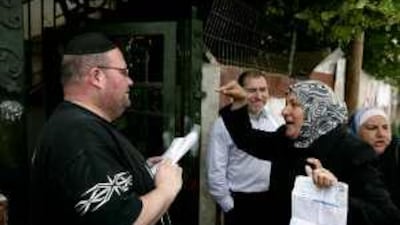For decades, Jews and Palestinians have fought over who has the legal right to reside in the small area of Karm al Jaouni JERUSALEM // "Liars," the elderly woman cried out. Her barb was aimed at two young Jewish men giving an interview to a camera crew. "Don't listen to them, they only lie." The two men carried on undaunted and the handful of activists and journalists gathered on this street in Sheikh Jarrah, East Jerusalem, on Wednesday, did not bat an eyelid.
Tension is not unusual here. The police say they are called out on average every two days for some disturbance involving the 28 Palestinian families who have lived there since the 1950s and a group of Jewish settlers who moved in last year. But the battle for Karm al Jaouni, or Shimon HaTzadik as the area is called in Hebrew, has far broader implications than merely control of land. It goes to the heart of the Palestinian-Israel conflict and its result will prove a strong indication of how, or indeed if, any resolution to the conflict will ever be found.
The legal tussle over Karm al Jaouni has now gone on for decades. On the one side are Palestinian families who fled their properties in what became Israel in 1948. With the aid of Jordan and the UN, they moved into newly built houses on the then empty plot of land in 1956. However, according to Yonatan Joseph, a spokesman for the settlers in the area and one of the two men branded liars by the elderly Palestinian woman, the "Arabs", as right-wing Israelis prefer to call Palestinians, presented deeds to the land written in ball pen. They were "obviously forgeries".
"We have deeds that the courts accepted," said Mr Joseph. "This area was Jewish from 130 years ago." Ownership of Karm al Jaouni was claimed in 1972 by the Sephardic Community Committee, a Jewish settler organisation, based on a deed dating back to 1875. According to the committee, the land, which contains a tomb revered by both Muslims and Jews, was bought and settled by Jewish immigrant families in the late 19th century. The Jewish residents fled in 1948 when the area came under Jordanian control.
"I've seen their documents," said Daoud Dajani, 64, trying hard to suppress his anger. His family is now threatened with eviction from the house they have lived in since he was a boy. "They are fake. Not that that will help me. There is no law for me here." The veracity of the committee's deed has been challenged in court. But no court has to date ruled specifically on the legal ownership of the land. Nevertheless, based on a rental agreement that was reached out of court in 1982 and which by implication recognised the committee as owners and the families as protected tenants, police last year began implementing eviction orders that the committee had begun to sue for in 1999 for non-payment of rent.
The results have in some cases been absurd. The al Kurd family was ordered to vacate a newly renovated section of their house. Settlers promptly moved in and Palestinians and Jews all sleep under one roof now. The al Ghawi and Hanoun families were forcibly ejected from their homes. Their houses have been taken over by settlers. The families, refusing to leave the area, have erected tents in the gardens of their Palestinian neighbours.
Three more families are now threatened with eviction, the Sabbaghs, the Daoudis and the Dajanis. The case, meanwhile, has become something of a cause célèbre among Palestinians and left-wing Israelis, who have joined forces to stop the evictions. But more than the fate of 28 families is at stake. Politically, say Palestinians, the battle for Karm al Jaouni illustrates how Israel is trying to ensure that East Jerusalem will never become the capital of a Palestinian state. By inserting Jewish communities deep into the heart of Palestinian neighbourhoods, Israel is in effect pre-empting any possibility of implementing the 2000 Clinton Plan, which foresees a division of Jerusalem by ethnic community.
The case also illustrates the different statuses Palestinians and Jews hold in Israeli law. The 28 families who live in Karm al Jaouni are all residents of East Jerusalem, which Israel unilaterally annexed, and thus citizens of Israel. But although they all hold deeds to land and property inside Israel, they have no recourse to any law to claim it back. On the contrary, according to the 1950 Absentee's Property Law, they are considered "present absentees" and their land and houses have long been the property of the Israeli custodian; in effect, the state.
"There is no reciprocity. The families cannot claim anything back through Israeli law," said Mohammad Dahleh, a Palestinian-Israeli lawyer who has represented the 28 Palestinian families in the past. Moreover, he said, the Absentee's Property Law was enacted precisely for that purpose. "The law essentially legitimises the theft of Palestinian property," said Mr Dahleh, who called the Karm al-Jaouni case "symbolic of the whole conflict".
"Israel basically says: 'This is mine, and this is also mine.'" Mr Joseph had no sympathy for the fact that the Palestinian families who are now his neighbours could not sue for their lands inside Israel. When pressed, he said Palestinians had "voted for Hamas who wants to kill Jews. So they can have no rights". When pressed further, he referred to the Bible. "This land is all Jewish in the Bible. The Arabs have 22 countries. They can go there."
When pressed again, he said he would "not accept" that Palestinians had any right to claim their properties within Israel back. To Mr Dajani, a pharmacist by trade, this came as no surprise. "I don't exist to them. I'm not a human being in their eyes. They certainly don't believe I have any rights." okarmi@thenational.ae

